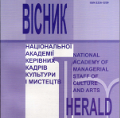Наративна сутність мовного контенту у висловленні композитором оцінки власної творчості
Narrative essence of language content in the expression of the composer evaluation of their own creativity
Author(s): Victor Ivanovich StepurkoSubject(s): Semiotics / Semiology, Music, Sociology of Culture, Sociology of the arts, business, education, Sociology of Art
Published by: Національна академія керівних кадрів культури і мистецтв
Keywords: language content; creative narratives; artistic conceptuality; decoding;
Summary/Abstract: The purpose of the article is to investigate the narratives of contemporary Ukrainian composers in the context of their assessment of their own work and the actual existing musicological components of each work: its purpose, the whole conglomeration of musical means of expression, and their multidimensional and multifunctional context. Attention is focused on the problem of inconsistency of the author's linguistic content in expressing his own ideas about his work, with the actual state of affairs, in terms of musicological logic, psychology, etc. The research methodology is based on the analysis of the sphere of expression of human thinking by R. Bart, K. Bremon, F. Jameson, T. Tytarenko, Ts. Todorov, E. Tshebinski and others. Also, studies by G. Gadamer, M. Heidegger, P. Reeker, R. Harre, which consider the narrative as a discursive structure, formed on the basis of their own experience. In the field of musical art, the problem of narratology is paid attention to in the works of N. Gerasimova-Persidskaya, O. Zinkevych, Y. Chekan, and some other musicologists. Scientific novelty. For the first time in the work a comparative analysis of the subjective-authorial understanding of composers of the narratives of their own work with the musicological, culturological, and socio-political context of the existence of the individual, to establish the artistic conceptuality of some of their works. Conclusions. It is established that the assimilation and awareness of meaning are possible only through certain messages that can have many meanings, and decoding them together can take any form. Thus, at the junction of the meanings of the narrator and the listener, his interpretive understanding appears, which becomes the basis of the final conclusion.
Journal: Вісник Національної академії керівних кадрів культури і мистецтв
- Issue Year: 2021
- Issue No: 4
- Page Range: 156-160
- Page Count: 5
- Language: Ukrainian

